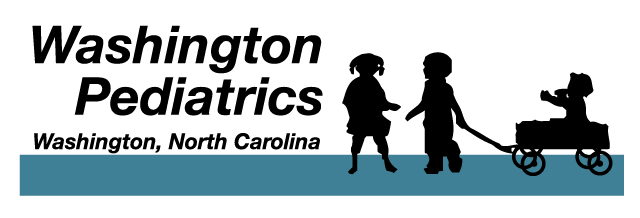Trust Washington Pediatrics
Schedule an Appointment Today!Offering Gentle Care to Patients of All Ages
Trust Washington Pediatrics to provide excellent pediatric services. We have provided peace of mind to parents and guardians throughout Washington, NC, and surrounding communities for over half a century. From infant care to advising adolescents to vaccinating our youth, choose our pediatric professionals team.
General Physical Exams
Baby Basics
Feeding
Although breastfeeding is encouraged, it is a decision reserved for each individual mother. There are excellent formulas available on the market that provide satisfactory nourishment.
Breast Feeding Techniques
We advise nursing frequently in the first few days of life. The chief stimulant that produces mother’s milk is the infant suckling. If the mother feels capable, she should nurse as often as she wishes.
After your milk comes in, you may still find that your baby will nurse on an irregular schedule. The baby may nurse several times in four hours and then skip feeding for the next four to six hours. This is perfectly normal. Use your judgment as to how frequently to feed. Often your baby will establish a schedule as convenient as the one you try to devise for them.
Sore nipples are frequently present in the first few days of nursing. This invariably passes as soon as the baby has been nursed for a few days. It is better to go on and nurse when nipples seem sore because the more you nurse, the sooner the soreness will stop.
Breast Care
Bottle Feeding
Frequency of Feeding
Burping
Bathing
Wash your baby with mild soap and water just as you would wash yourself. When cleaning a baby’s bottom after defecation, it may be necessary to use cotton and water to remove excess stool. We advise against lotions and oils as they may do more harm than good to an infant’s skin.
Care of the Cord
Circumcision
Stools
If your baby’s bowel movements are irregular, don’t worry! This is completely normal. Some infants have stool after each feeding, while others may skip a day. Many babies strain and cry when they have a stool. These are usually normal for a newborn. Unless the infant acts sick, there is no need to worry. If you are experiencing issues with your infant’s bathroom schedule, speak with our experts today at 252-946-4134.
Diapers & Wetting
Sleeping
Safety Seat
The Highway Safety Research Center supplies an excellent pamphlet before leaving the Hospital. Car seats are required by law in North Carolina. Infants should NOT be placed in the front seat of your car if the vehicle is equipped with a passenger-side Air Bag.
Crying
The most helpful way to encourage your infant to settle down is to handle your baby the same way every time. The most characteristic feature of a newborn is adjusting to your behavior. Almost all mothers handle their infants a little bit differently. That’s fine as long as you do the same thing all of the time.
One last piece of advice: if you are around your baby day in and day out, you will be an expert very soon. You will, of course, know more about the baby than anyone. Do the best you can. The overwhelming odds are that you will be doing the right thing.
Fever
Older infants and children tolerate fever better than young infants. Please give them appropriate doses of acetaminophen (Tylenol) every four hours to help with the discomfort. The infant’s appearance and behavior are more important than the height of the fever.
Immunizations
Your infant’s first immunization will be given in the hospital if you so desire. Hepatitis B is now preventable, and we strongly encourage parents to protect their children against serious diseases. The schedules for immunizations will be reviewed with your pediatrician when you come in for your first appointment. These vaccinations are available at our office and the local health departments. Call today to schedule a vaccination appointment.
Psychological Services
Washington Pediatrics offers pediatric psychotherapy services for a wide range of needs. We provide individual and parent/child sessions to help manage behaviors.
Frequently Asked Questions
How do I get started?
Call our office at 252-946-4134 to request a Psychological Services referral packet. This packet includes a summary of our policies, insurance questionnaire, and questionnaires about your child and concerns. Once you return the packet, we will contact you with an appointment time.
How many times do I have to take my child in?
What are the costs?
Reach Out & Read
ROAR’s Components
- Each child ages two weeks to 5 years receives a free book, selected based on the child’s developmental stage.
- Pediatricians and staff are trained in literacy development and inform parents about early childhood literacy for a child’s development.
ROAR’s Emphasis on Literacy
How to Help!
- Monetary Donations: Monetary donations enable us to purchase new books for the ROAR program.
- New & Used Book Donations: New books allow ROAR to distribute books to children with their well-child check-ups, while used books allow us to give books to older siblings and underprivileged families.
Washington, NC, 27889
Business Hours
Saturday: 8:30 am - 12 PM
Sunday: Closed
Get In Touch

